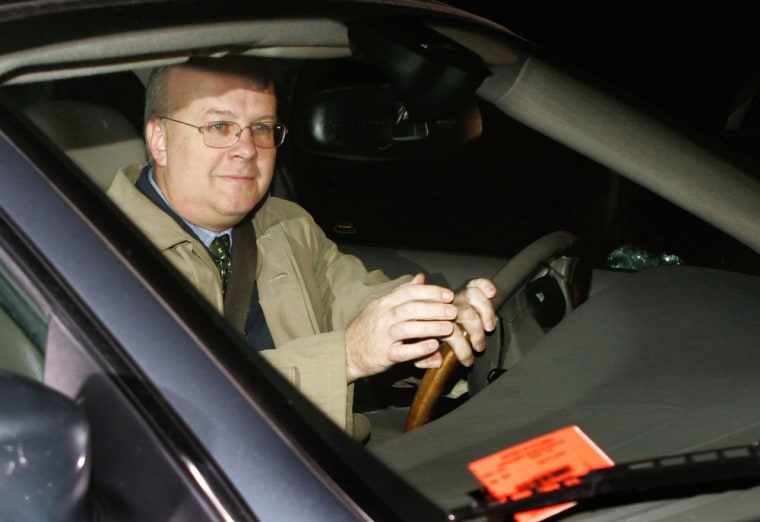The prosecutor in the CIA leak probe set the stage Wednesday for possible criminal charges, meeting with the grand jury that heard months of testimony and then consulting with the chief judge at the courthouse where the legal drama has unfolded.
The White House braced for at least one indictment by week’s end, possibly Vice President Dick Cheney’s chief of staff, I. Lewis “Scooter” Libby. It also was worried that President Bush’s top political adviser, Karl Rove, remained in jeopardy of being charged with false statements.
Rove awaited final word Wednesday evening about his fate, though his supporters were concerned about a personal visit Special Prosecutor Patrick Fitzgerald paid to Rove’s defense lawyer and a last-minute interview with one of Rove’s former colleagues.
FBI agents working for Fitzgerald checked facts this week that could be used in a case, including whether Rove made any comments to that former colleague about his contact with one of the reporters who disclosed that Bush administration critic Joseph Wilson’s wife worked as an undercover CIA officer.
Though Fitzgerald met with Rove attorney Robert Luskin at a private law firm office Tuesday, there was no indication of a final decision on an indictment.
Fitzgerald was appointed nearly two years ago to determine whether any presidential aides violated a federal law prohibiting the intentional unmasking of an undercover CIA officer such as Valerie Plame. Her identity was divulged in July 2003 after her husband publicly criticized the administration over its use of prewar Iraq intelligence.
Other charges discussed
The prosecutor also has discussed other charges with defense lawyers in recent weeks, including false statements, obstruction of justice and mishandling of classified information. Libby and Rove have emerged as two of the key figures in the probe.
The grand jury’s term expires on Friday, and the panel met with Fitzgerald’s team for about three hours Wednesday before adjourning for the day. The administrative assistant to Thomas Hogan, the chief judge of U.S. District Court in the nation’s capital, disclosed that Hogan met with Fitzgerald. The assistant, Sheldon Snook, declined to comment on what was discussed.
Prosecutors wrapping up a criminal investigation can meet with the chief judge for a variety of reasons, such as extending the life of the current grand jury, empaneling a new grand jury, temporarily sealing indictments, or simply preparing logistics for indictments or the closing down of the case.
Though weary from days of intense speculation about the fate of two of their most senior colleagues, White House aides tried to carry on with their normal work. Rove and Libby joined other administration officials at the daily White House senior staff meeting, as usual. Libby has been on crutches after breaking a bone in his foot.
“We’re focused on the work at hand,” said White House press secretary Scott McClellan, who added, “We obviously continue to follow developments in the news.”
Poll shows public divided
The public appeared divided about the controversy. A CNN-USA Today-Gallup poll taken over the weekend found 39 percent of Americans believe the leak of Plame’s name was illegal, another 39 percent believed it was unethical but not illegal and the remainder saw nothing wrong or were not sure.
Fitzgerald has been in Washington since Monday, and over the past two days he has dispatched FBI agents to conduct 11th-hour interviews.
One interview involved the former Rove colleague. Another set of interviews occurred in the neighborhood where Wilson and Plame lived. Agents asked neighbors whether they had any inkling that Plame worked for the CIA.
Such interviews may help Fitzgerald establish that Plame had carefully protected her CIA identity, part of the process of determining whether the disclosure of her name amounted to a crime that hurt national security.
When the controversy erupted two years ago, the White House adamantly insisted no presidential aides had been involved in leaking Plame’s name to punish or counter Wilson’s criticism over Iraq.
But Fitzgerald’s team meticulously gathered evidence showing Rove met with two reporters before Plame’s name was published, and Libby had contact with at least three reporters.
